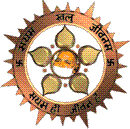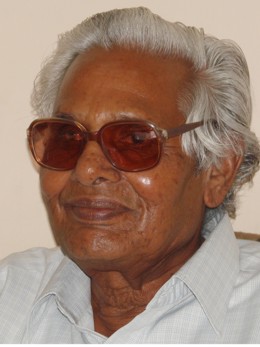
I cannot resist the temptation of quoting here Acarya Tulasi and Yuvacarya Mahaprajna's message issued to the Parliament of the World's Religions about Anuvrata Philosophy. They say:
"The twentieth century is a century of scientific achievements. During this period science has made advances in all directions. Their social advantages are self-evident. The facilities and conveniences available today were not there in the past. As a result of these facilities all physical discomforts have been considerably reduced. One is reminded of an ancient Sanskrit maxim - Skandhat Skandhantaram naya t- it is a human habit to transfer the burden from one shoulder to another and thus feel comforted. It is not indicative of the present state of affairs. We are exchanging one king of unhappiness for another. This succinctly characterizes the tendency to yield to convenience. The hedonistic attitude gave birth to materialism and the latter created an endless appetite for the accumulation of wealth. According to us violence, terrorism and other similar evils are not basic but derivative. The real factors causing them are the attitudes rooted in consumerism, acquisitiveness and hedonism. Those who are actually engaged in violence and are terrorizing people have no different attitude. Ordinary people in society desire convenience, consumer items and wealth; so do those spreading violence and terror.
No effective method of preventing terroristic activities and crimes can be found without having an integrated approach to economic planning. Intellectually, it was felt that all such problems would be resolved automatically with economic development. However, experience has shown that economic development has further complicated these problems. The solution to the problem can be summed up in one word-self-restraint. It is essential that it should be practised on an extensive scale. Self-restraint connotes reduction and limitation. It means exercising restraint in relation to conveniences, consumption and wealth. It is in this context that Anuvrata Declaration 'self-restraint alone is life' (samyamah khalu Jivanam) is capable of providing a permanent solution to the present day problems.
Man lives by bread but he cannot live by it alone. Even what we eat and drink proves nourishing only when it accompanied by restraint. Thus, it can be said that what gives life to life or the supreme life-sustaining principle is self-restraint. And if there is any one thing that has been most neglected in the scientific age, it is self-restraint. The message of Anuvrata is that of self-restraint. The philosophy of Anuvrata is that of self-restraint. To spread this message extensively we will have to study both our past and our present. And the greatest concentration has to be on the present education system, which is responsible for the present-day hedonism, consumerism and acquisitiveness.
We can hope for a new man, a new society and a new world if the seeds of self-restraint are sown in the young students' minds from the very beginning. Materialistic expansion and spread of armaments cannot bring about a new world order. It is a reality and we will do ourselves immense good by accepting it. For if we refuse to accept it now, the problems arising in the future will compel us to do so.
Anuvrata was relevant when it was started. But today it is infinitely more relevant. Its relevance has increased a thousand fold. What is needed now is that we should all come together and apply our minds collectively to the basic cause of our problem. Mere pruning of leaves or watering the plant will not do. We have to find out the root cause. We will find that the biggest problem today lies in our education and life-style. To find a solution serious deliberations are needed by putting all the heads together. The Anuvrata philosophy is must for a happy and peaceful life. From this point of view it can be said that the twenty-first century will be the century of Anuvrata, the century of spirituality. We hope that the people will give serious thought to it and will adopt anuvrata as the way of life for ensuring survival of not only human beings but all forms of life.
What is Anuvrata? Briefly the following points can encapsulate it:
- It is a human code of conduct.
- It is a non-sectarian religion.
- It is a philosophy of life, which gives primacy to character or righteousness and holds worship to be secondary.
- It is a philosophy, which relatively gives more importance to the present than to the past or the future and concentrates on ways of proper living and evaluating the present.
- It is a new formula for solving our problems.
- It is a vow to reduce one's wants and limit one's consumption.
It asserts the following truths, which keep stirring our consciousness.
Let the world be transformed through the Anuvrats.
 Dr. Sohan Lal Gandhi
Dr. Sohan Lal Gandhi